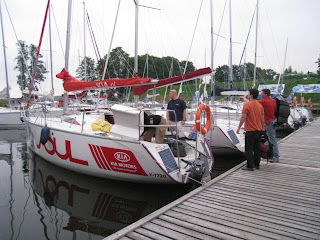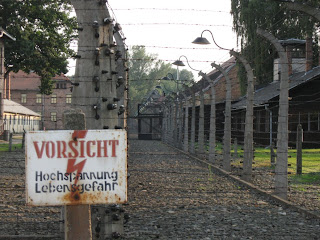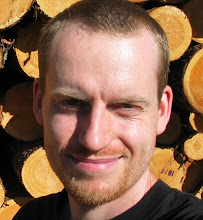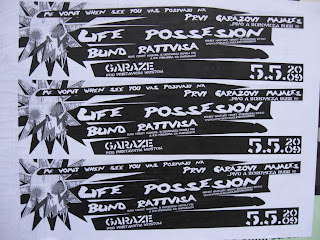OK, that has been a very long period of silence. No, the sailing boat I went on did not get lost in some mysterious fog, I actually got sidetracked on my detour to Poland. I spent three weeks there, trying to educate myself most of the time, but then after heading back to Slovakia I had to interrupt my travels due to some health issues. And somehow I didn't find the time to write about those amazing three weeks in Poland... until now! Health wise it is looking good again and I am about to hit the road again.
Originally I had not even planed going into Poland on my trip. But when I learnt that my friends from back home were going there for a sailing trip I thought it would make a welcome change to living in hostels. Money wise it didn't cost much to go there from Slovakia anyway and renting a sailing boat - even one that sleeps 6-8 people - is pretty cheap in Poland, too. And so I was off to Poland's Masurian Lake District. I had been there sailing with my friends before a couple of times, but we still haven't got tired of the place because every time we go there the boat is a different one, we go on different lakes and we meet new but always friendly and hospitable people.
Originally I had not even planed going into Poland on my trip. But when I learnt that my friends from back home were going there for a sailing trip I thought it would make a welcome change to living in hostels. Money wise it didn't cost much to go there from Slovakia anyway and renting a sailing boat - even one that sleeps 6-8 people - is pretty cheap in Poland, too. And so I was off to Poland's Masurian Lake District. I had been there sailing with my friends before a couple of times, but we still haven't got tired of the place because every time we go there the boat is a different one, we go on different lakes and we meet new but always friendly and hospitable people.
 After a long drive into East-Poland it is BOARDING TIME!
After a long drive into East-Poland it is BOARDING TIME!
Besides of being a beautiful and unspoilt area, one where you can camp wild and make fires all year round, the Masurian Lake area is also rich in history. The Wolf's Liar (Wolfsschanze) is there, once one of Adolf Hitler's headquarters and now a large open air museum that tells the story of Stauffenberg's attempted assassination on Hitler.
 When stopping at a private landing place our whole crew got invited for dinner by these friendly folks.
When stopping at a private landing place our whole crew got invited for dinner by these friendly folks.We had visited Wolf's Liar already during an earlier sailing trip in the Masurian Lakes, so we were ready to see something new this year. Our sailing map indicated an isolated bunker not too far from one of the landing places and so we stopped there early one afternoon, took our map, locked up the boat and went into the forest where the bunker was supposed to be. We didn't stay long. There were squillions of hungry mosquitoes waiting for us and we had no choice but to abort our little “Indiana Jones” adventure. World War 2 became a topic again at the end of the sailing trip when we went to Bialystok, the home town of our captain. We met up with one of his friends for the evening and this guy turned out to be an expert on war machinery. It was very interesting, and at the same time bizarre, to be taught by this young Polish surgeon about the deficiency of Germany's World War 2 tanks (they run on synthetic fuel which had high production costs and gave low mileage, and Russian diesel supplies could not be utilised and also the tank tracks were too narrow to manoeuvre safely on the often soft and soggy ground in the eastern terrains).
On the way back to Germany I asked my friends to drop me off in Warsaw. The “tank expert” had recommended to visit the Warsaw Rising museum there (not to be confused with the rising in the Jewish ghetto) and that is what I was going to do. After asking a few people I managed to find it and during the following four hours I learnt not only about the activities and crimes commited by Nazi-Germany there, but also the merciless and self-interested conduct of the Soviets to secure freed territories for themselves and establish a communist government in Poland. Before I started my trip I had no particular interest in history and so all the knowledge I did have was based on my East-German education, which of course had presented a very single-sided analysis of the Soviet role in the liberation of Europe from the Nazis.
When I arrived at my hostel that night I discovered the fabulous “Use-It” city guide to Warsaw, which did a great job in selling the city and gave good background information to the various sites. I also was still moved by the faith of the city during the war that I had just learnt about in the museum, and so I decided that Warsaw deserved more than just a couple of days and I booked a whole week at the hostel. The following days I walked up and down on Warsaw's streets, explored cemeteries, bazaars, communist style eateries and the few houses that were not destroyed during the war. Then came the weekend and I was invited to stay with the sister of the captain from my sailing trip, and her husband. And once more I was spoilt by Polish hospitality (thank you again for the fantastic time!). During conversations with my hosts it became apparent that I had managed to discover a few spots in Warsaw unknown to them, and they were also surprised that I had managed to enjoy Warsaw for a whole week. But that wasn't too much of a surprise because as it turned out, they both had not grown up in Warsaw but had moved there because of the good work opportunities, rather than being attracted by the city itself. The funny side of all this was that, whilst walking with them through the city, I realised how much I had missed out on because I don't speak Polish and I also didn't know half as much about Polish history as those two. And so the weekend was a true pleasure.
 Shrines like this can be found in many courtyards of house that have survived World War 2. People erected them to help them endure the years of war and terror.
Shrines like this can be found in many courtyards of house that have survived World War 2. People erected them to help them endure the years of war and terror. The Palace of culture and science, also known as Stalin's wedding cake, is an “offspring” of Moscow's “Seven daughters of Stalin” skyscraper and used to symbolise Russian domination.
The Palace of culture and science, also known as Stalin's wedding cake, is an “offspring” of Moscow's “Seven daughters of Stalin” skyscraper and used to symbolise Russian domination. Quality food for almost nothing at a communist style eatery: people cueing with their receipts at the food outlet.
Quality food for almost nothing at a communist style eatery: people cueing with their receipts at the food outlet. The rooftop of the university library features a garden, inviting everyone to wander around and enjoy the view.
The rooftop of the university library features a garden, inviting everyone to wander around and enjoy the view.From Warsaw I went back to Slovakia with just one short stop in Krakov in order to visit Auschwitz from there. Some people that I have met since going to Auschwitz were quite clear that they don't want to go to such a horrible place; they said they know what happened there during World War 2 and hence there is no need to go there. My motivation for going there was driven by the question of how a place like this was able to exist and function. How could it get so far that the Nazis were able to kill millions of people in camps like Auschwitz, and what had happened to the people “working” in these camps to be actually able to commit these atrocities? Because, at some point, they all must have started out their lives as innocent children, right? Three days in a row I went to Auschwitz. One day alone I spent on the main exhibition where I read a lot of the original German language orders and decrees that were on display and another whole day was spent on the Dutch exhibition, one of the many “national exhibitions”, which told from the faith of the Dutch Jews during the war. Looking back at history, these national exhibitions made the strategy of the Nazis regarding the Jews transparent: identification, registration, marking of identification papers, night-time curfew, setting up of ghettos, confiscation of businesses and assets, occupational ban, requiring them to wear the yellow star and then arrest followed by deportation and extermination.

Visiting Auschwitz also was a very bizarre experience. For most people it seems to be just another stop on their sightseeing trip through Europe. They spend couple of hours rushing through the main exhibition, they peek through doors and windows and glance over posters, and amazingly many pose under the infamous “Arbeit macht frei” entrance gate to have their picture taken by friends, before they all are picked up again by their buses. And so many a time it felt like being at a tourist attraction rather than a memorial site. Despite of this, at the end of the three days at Auschwitz I had the feeling that I had found some answers to my questions and I was ready to go back to Slovakia and continue my trip.

New on board since those three weeks in Poland is an increased interest in European history and I am looking forward to pursue this interest further now that I am starting to travel again.










































